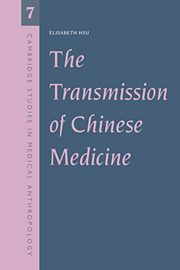Book contents
- Frontmatter
- Contents
- Acknowledgements
- Note on Chinese terms
- Introduction: ways of learning
- 1 The secret transmission of knowledge and practice
- 2 Qigong and the concept of qi
- 3 The personal transmission of knowledge
- 4 Interpreting a classical Chinese medical text
- 5 The standardised transmission of knowledge
- 6 Teaching from TCM texts
- Discussion: styles of knowing
- Appendix: Curriculum for TCM regular students and acumoxa and massage specialists
- Glossary of medical and philosophical terms
- References
- Indexes
2 - Qigong and the concept of qi
Published online by Cambridge University Press: 04 December 2009
- Frontmatter
- Contents
- Acknowledgements
- Note on Chinese terms
- Introduction: ways of learning
- 1 The secret transmission of knowledge and practice
- 2 Qigong and the concept of qi
- 3 The personal transmission of knowledge
- 4 Interpreting a classical Chinese medical text
- 5 The standardised transmission of knowledge
- 6 Teaching from TCM texts
- Discussion: styles of knowing
- Appendix: Curriculum for TCM regular students and acumoxa and massage specialists
- Glossary of medical and philosophical terms
- References
- Indexes
Summary
Qiu's qigong healing performances left observers puzzled, wondering how Qiu's murmurs and movements could have a therapeutic effect. This chapter first accounts for qigong from the outsider's viewpoint by identifying five stages of social interaction in the therapeutic process. The insider's view, discussed thereafter, explores Qiu's ‘logic’ of healing. There is evidence that it was primarily grounded in the notion of ‘life-for-life’, although Qiu also spoke about restoring balance, as is characteristic of Chinese medicine or any other scholarly medical tradition. The concept of qi and how it relates to conceptions of the body in qigong and Chinese medicine is explored at the end of the chapter.
The outsider's observations
Qigong therapy was not passively consumed but characterised by interaction between healer and client. As an outsider I could observe five different stages: (1) the client's choice of therapy, (2) the healer's effort to recruit clients, (3) mutual commitment, and (4) reaching consensus about the termination of treatment. Yet, even if treatment was successful, the healer-client relation was often not dissolved. The last stage concerned (5) the conversion of client into ‘friend’ (pengyou).
Choice of therapy
Most of Qiu's clients had turned to qigong as a last resort after consulting all kinds of other therapists. Many had previously sought treatment in government hospitals. Depending on the ailment they suffered, they had consulted biomedical and/or TCM doctors and private practitioners of ‘Chinese medicine’ (zhongyi), ‘herbal medicine’ (caoyi), or traditional ‘massage’ (anmo). Only a few had been to another qigong healer.
- Type
- Chapter
- Information
- The Transmission of Chinese Medicine , pp. 58 - 87Publisher: Cambridge University PressPrint publication year: 1999



